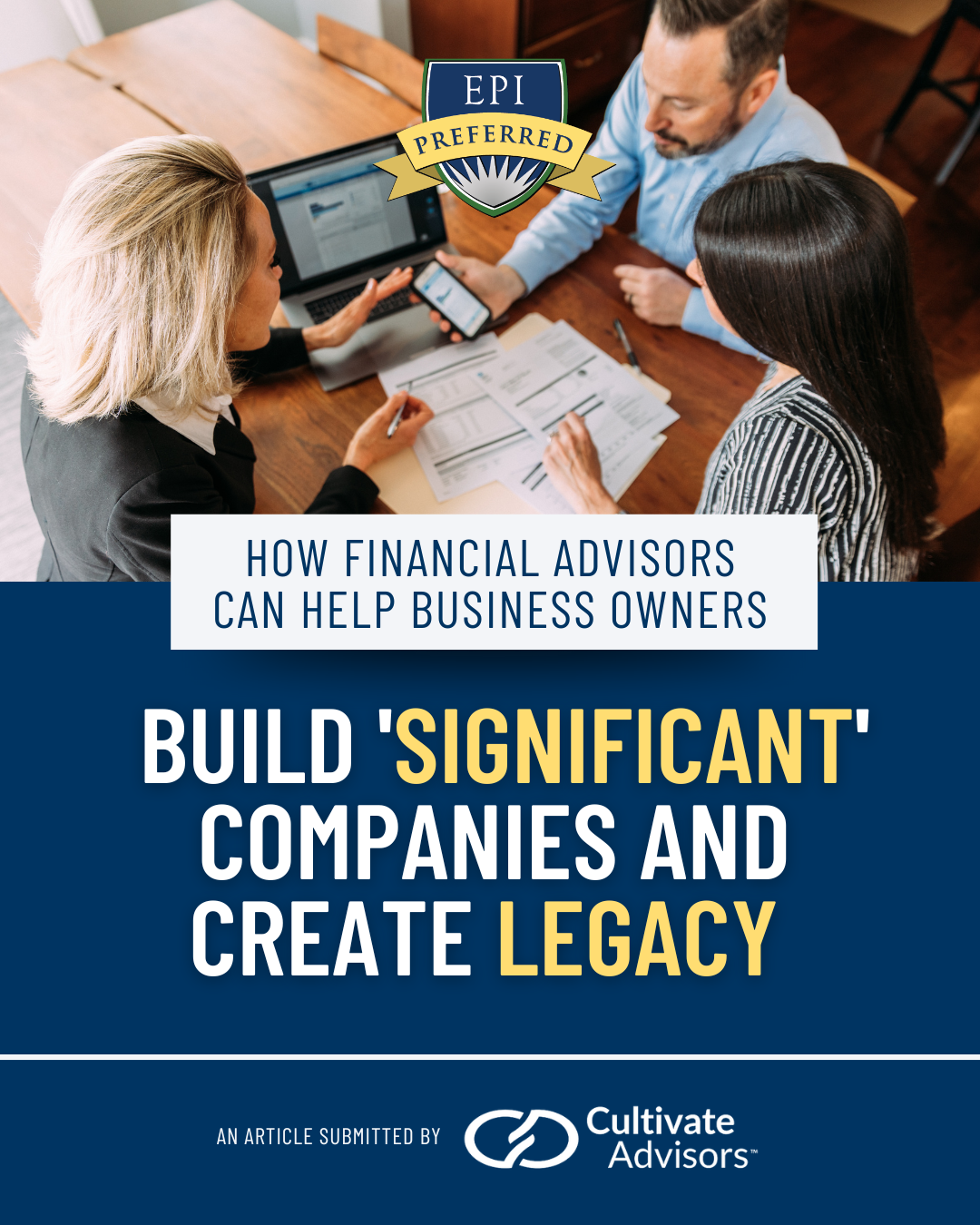
THE EXIT PLANNING BLOG
Keep up-to-date with exit planning, succession planning, industry trends, unique specialty insights, and useful content for professional advisors and business owners.
Share this
How Financial Advisors Can Help Business Owners Build Significant Companies and Create Legacy
by Partner Contributed Article on April 24, 2025

The role of a financial advisor extends far beyond managing investments. For business owners, the most valuable asset they own is often their business. Yet, many fail to recognize its true worth or take the necessary steps to enhance its value. This is where best-in-class advisors step in—not just to manage wealth but to help business owners create a "significant" company, one that is transferable and leaves a lasting legacy.
The Difference Between a "Successful Business" and a "Significant" Business
A successful business is an entity that generates good revenue and profit, while a significant business is built to last beyond its current ownership. It is transferable, has systems in place, and is not solely dependent on the owner's direct involvement. Significant businesses command higher multiples, are more attractive to buyers, and provide their owners with optionality and financial security post-exit.
As a financial advisor, your ability to help business owners transition from a successful business to a significant one adds immense value—not just for them but for their families, employees, and the broader economy. A significant company creates additional wealth and a ripple effect.
Key Challenges Business Owners Face
Most business owners are deeply involved in day-to-day operations but may not be thinking strategically about long-term value creation. Here are some of the biggest blind spots they encounter:
- Lack of Business Valuation Awareness – Many owners do not know their business's current or potential value, making financial planning and exit strategies difficult.
- Treating the Business as an Income Source Rather Than an Asset—Owners must shift their mindset to see their business as a wealth-building vehicle.
- Operational Inefficiencies – Many business owners struggle with financials, leadership, marketing, or scaling operations, which can hinder long-term growth.
- 70% of Businesses Don’t Sell – Most businesses fail to transition successfully without proper planning, often leaving owners without that additional wealth opportunity.
- Fragmented Advisory Teams – Many business owners work with multiple advisors in silos, missing opportunities for tax efficiency, value growth, and wealth transfer.
How Financial Advisors Can Bridge the Gap*
To help business owners create a legacy, financial advisors must integrate business value acceleration into their advisory process. This requires a shift from traditional wealth management to a more holistic approach that includes business valuation, exit planning, and strategic partnerships.
1. Quantify The Business Value
The first step in helping business owners is ensuring they understand the value of their business. Without this, making informed decisions about retirement planning, succession, or growth strategies is impossible. Advisors should:
- Provide access to business valuation tools.
- Educate clients on industry multiples and key value drivers.
- Identify the value gap
- Conduct annual business value assessments.

2. Develop a Prioritized Action Plan
Once business value is established, the next step is identifying ways to increase it. This is where collaboration with a Value Advisor becomes essential. Together, advisors can help business owners:
- Pinpoint business value, profit, operational systems, leadership, and financial management gaps.
- Build a roadmap to increase revenue, profitability, and enterprise value.
- Align business goals with personal and financial objectives.
3. Close the Wealth Gap
Most business owners do not have a clear picture of their Wealth Gap—the difference between their current assets (including the business) and the financial resources needed to support their post-exit lifestyle. Financial advisors can:
- Assess the owner's personal financial situation.
- Identify strategies to close the Wealth Gap.
- Integrate business value growth with personal wealth planning.
4. Collaborate with a Multi-Disciplinary Team
A truly significant business requires an ecosystem of support. Financial advisors can serve as the quarterback, ensuring that business owners work with tax strategists, estate planners, and legal professionals to optimize their financial future. This collaborative approach helps:
- Implement tax-efficient exit strategies.
- Structure wealth transfer plans.
- Secure long-term financial stability post-exit.
A Proven Process for Maximum Impact
At Cultivate Advisors, we help financial professionals integrate business value acceleration into their practice through a structured, proven process:
- Discovery Call – A high-level conversation to assess the business owner’s goals and introduce the Business Health and Value Assessment.
- Prioritized Action Plan Development – A deep-dive session where financial advisors, business owners, and Value Advisors collaborate on a roadmap for value creation and exit readiness.
- Ongoing Strategic Support – Implementation of the action plan, closing the Wealth Gap, and preparing for a successful transition.
The Competitive Advantage
By embedding business value acceleration into your advisory services, you differentiate yourself from traditional financial planners. You become an essential partner in your client’s business and personal wealth journey, ensuring that they not only grow their business but also create a lasting legacy.
The best financial advisors don’t just manage wealth—they help create it. By guiding business owners in building significant businesses, you position yourself as an indispensable advisor and a magnet for business owners.
*Exit Planning Institute believes exit planning is for all advisors, not just FAs.
Related Resources:
Share this
- Blog (548)
- CEPA (431)
- exit planning (249)
- CEPA community (188)
- Business Owner (175)
- Exit Planning Summit (99)
- EPI Chapter Network (89)
- Value Acceleration Methodology (81)
- Exit Planning Partner Network (76)
- EPI Announcement (50)
- Content (48)
- Webinars (37)
- Excellence in Exit Planning Awards (34)
- Marketing (30)
- 2024 Exit Planning Summit (28)
- 5 Stages of Value Maturity (26)
- Books (24)
- EPI Academy (24)
- EPI Team (22)
- Exit Planning Teams (22)
- Leadership (21)
- 2023 Exit Planning Summit (20)
- family business (20)
- women in business (19)
- Intangible Capital (18)
- Exit Options (17)
- Black Friday (16)
- CPA (15)
- Walking to Destiny (15)
- Chapters (14)
- State of Owner Readiness (14)
- charitable intent (13)
- Chris Snider (12)
- National Accounts (12)
- Small business (12)
- personal planning (12)
- Financial Advisors (11)
- Season of Deals (9)
- 5 Ds (8)
- About us (8)
- Podcast (8)
- Scott Snider (8)
- Insiders Bash (7)
- Christmas (6)
- Exit Planning Content Library (6)
- Case Studies (5)
- Owner Roundtables (5)
- Three Legs of the Stool (5)
- Value Advisors (5)
- financial planning (5)
- Awards (4)
- Circle of Excellence (4)
- EPI Thought Leadership Council (4)
- Exit & Succession (4)
- Five Ds (4)
- executive training (4)
- DriveValue (3)
- Owners Forum (3)
- author (3)
- forbes (3)
- Exit Is Now Podcast (2)
- Peter Christman (2)
- Veteran (2)
- Whitepapers (2)
- Annual Exit (1)
- Business Owners Forum (1)
- SOOR (1)
- business consultants (1)






